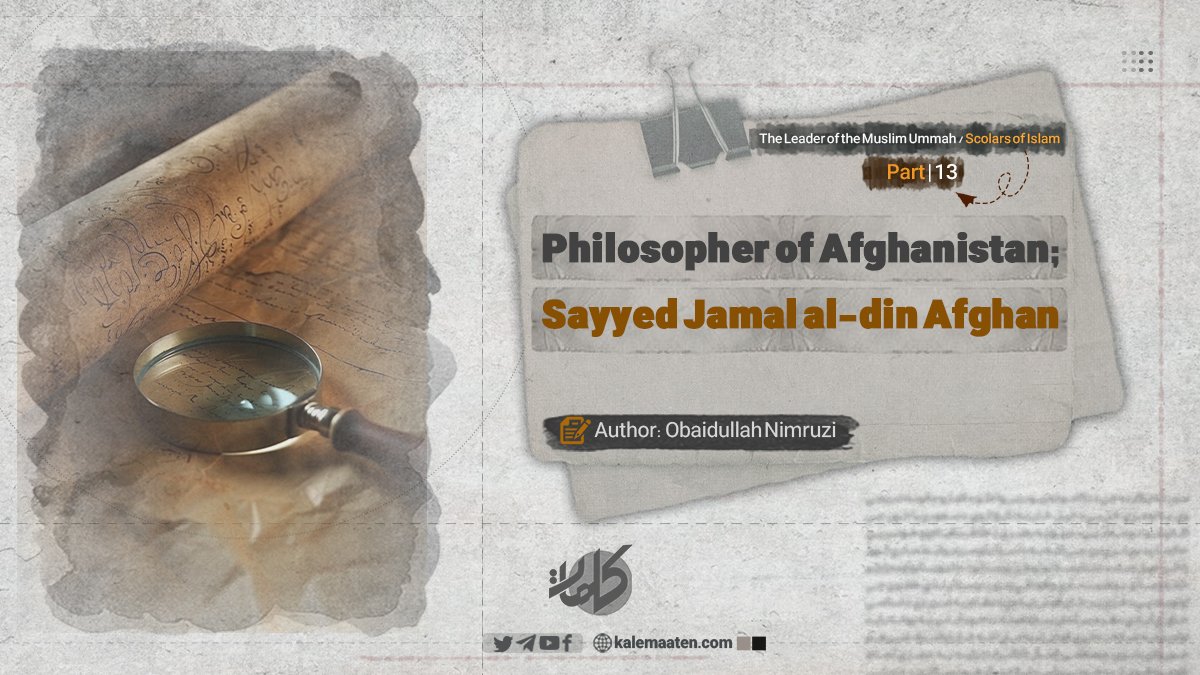
Author: Obaidullah Nimrozi
Philosopher of Afghanistan; Sayyed Jamal al-din Afghan (Part 13)
Conclusion
Sayyed Jamal al-din Afghan, known as “The Wise Man of the East” and “Martyr of Freedom,” is undoubtedly one of the greatest figures in the history of Islam and the East. He emerged as a social and political reformer in the second half of the 19th century, at a time when Islamic and Eastern countries were under the domination of European colonialists and suffering from internal corruption and political tyranny. Many Eastern nations faced serious challenges and were captives of foreign and internal oppression; therefore, the emergence of a figure like Sayyed Jamal al-din Afghan, who sought to liberate them from this situation and revive the greatness of the Muslim past, was a refreshing breeze of awakening and awareness for these nations.
Sayyed Jamal al-din Afghan understood that liberation from colonialists and tyrannical powers was only possible through awareness and knowledge. He believed that true freedom could be achieved through internal reforms, specifically through educating and training the people while strengthening their awareness. While many political leaders of the time neglected these reforms due to personal interests and fear of significant changes, Sayyed Jamal al-din remained steadfast in his commitment to educate the people of the East. He regarded science and education as powerful weapons against colonialism and tyranny, believing that knowledge was key to awakening people from ignorance and empowering them to confront oppression, both internal and external. Therefore, his primary slogan was “Science and awareness are the weapons of freedom.”
Sayyed Jamal al-din Afghan aimed not only to free the East from colonialists but also to cultivate reformist and resilient forces from within. He consistently emphasized that colonialists and Western powers were acutely aware that scientific and cultural progress in Islamic and Eastern societies would undermine their domination. He believed that by promoting illiteracy and ignorance, colonialists sought to weaken the will and potential of these countries. In comparison to the significant advancements made by Western nations in scientific, technical, and economic fields, Sayyed Jamal al-din Afghan argued that Eastern countries must resist these threats and denounce colonial powers by enhancing the levels of education and knowledge among their populations. His beliefs were, in essence, a call to revive Islamic and cultural values while fostering scientific progress, which signified a renaissance in Islamic and Eastern societies.
However, Sayyed Jamal al-din Afghan’s thoughts extended beyond the realm of science and awareness. He courageously criticized internal corruption and tyranny within Islamic and Eastern countries, actively working to reform their political and social structures. Sayyed Jamal al-din recognized that without political and social reforms, no meaningful change could occur in these societies. Thus, he utilized political activity as one of his primary tools for achieving reform. He sought to guide the rulers of Islamic countries from tyranny and corruption toward necessary reforms, emphasizing the importance of unity among Islamic countries and solidarity among Eastern nations. Sayyed Jamal al-din asserted that if these nations could unite and avoid discord, they would be able to achieve freedom and independence, standing firm against colonialism and external threats.
Although Sayyed Jamal al-din Afghan advocated for domestic reforms, his struggles were not confined to the borders of Islamic countries and the East. He was recognized as a global figure, striving for worldwide reform throughout his political life. He traveled extensively within the Islamic world and the East, making the promotion of awareness and knowledge his foremost agenda. These travels and efforts illustrated the depth of Sayyed Jamal al-din’s global perspective and his concern for humanity’s condition worldwide. By critiquing Western colonialists and colonial systems, particularly British colonialism, he endeavored to foster a global awakening against oppression and exploitation.
Sayyed Jamal al-din never wavered in his pursuit of goals, despite encountering numerous difficulties and restrictions impeding his reform efforts. He faced exile and political oppression in countries including Iran, the Ottoman Empire, and Egypt, enduring significant pressure from the rulers of the time. However, these obstacles did not deter him from his path. In every circumstance, whether in exile or facing fierce opposition, he consistently advocated for reforms and the liberation of the peoples of the East, seizing every opportunity to spread his reformist ideas. He became a catalyst for fundamental change in Islamic and Eastern societies, tirelessly pursuing his ambitious goals.
In conclusion, Sayyed Jamal al-din Afghan is recognized not only as a social and cultural reformer but also as a politician and activist who championed social, cultural, and political reforms. His ideas, particularly regarding education, awareness, Islamic unity and solidarity, and criticism of colonialism and tyranny, remain relevant and influential. Through his courage and integrity, he left a lasting impact on the modern history of Islam and the East, becoming a symbol of the struggle for freedom, independence, and justice. The legacy of Sayyed Jamal al-din Afghan will continue to shine in world history as a global figure committed to creating significant changes on both national and international levels.
His thoughts and actions continue to inspire many reformers and freedom fighters worldwide and can serve as a model for efforts aimed at achieving fundamental changes and progress in developing societies, especially within the Islamic world. He clearly demonstrated that ignorance, division, and passivity are detrimental; to attain long-term goals and significant reforms, one must confront challenges with knowledge and awareness. Sayyed Jamal al-din Afghan’s principles remain a guiding light for us, capable of playing an essential role in addressing today’s challenges.
Continues…


